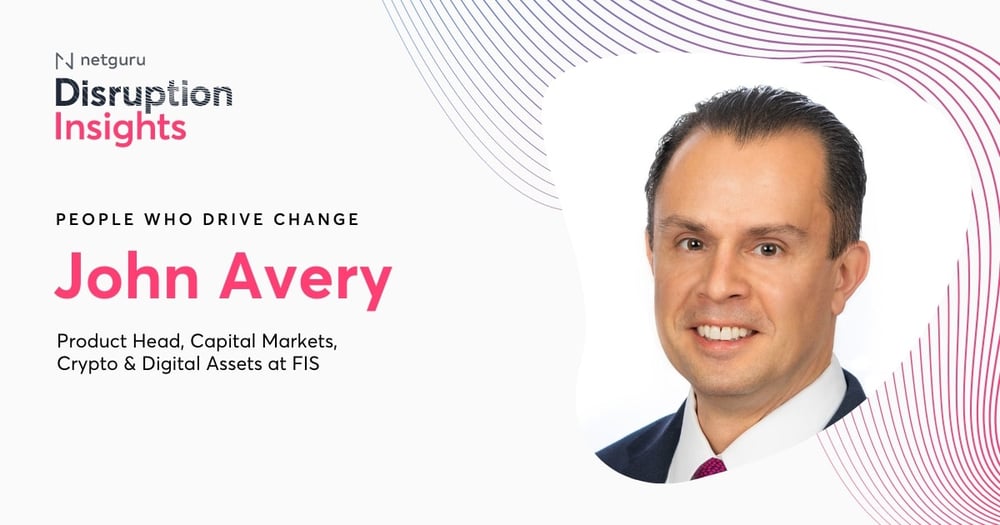Disruption Insights: Organizations Need to Be More Conscious of the World They Operate In

John has over 20 years of experience in the financial sector, having spanned roles such as developer, chief financial officer, and head of product, to name a few.
John currently leads a product team that connects the world of digital assets with institutional investors and lenders. His professional interests and investment initiatives include DeFi, blockchain, securities, real estate, and venture capital.
What technologies or solutions are really trending in fintech? Can we expect exponential growth in any fintech areas (like regtech or insurtech)? What role will regulators play in the expansion of financial startups? In the Disruption Insights series, we gather insights and opinions from industry experts to answer the most pressing questions and foresee the future fintech landscape.
💡 Trends in Fintech
Most impactful technologies in fintech
I believe that blockchain, AI/ML, and cloud computing have had and will have the most impact on the industry. The combination of these foundational technologies has the greatest chance of accelerating a solution’s time-to-market by reducing technology friction and creating positive economic transformation (growth and savings) in the financial ecosystems in which they’re deployed.
Solutions disrupting the industry right now
There are many exciting innovations and solutions in fintech, but I spend most of my time working with the combination of digital currencies, NFTs, and DeFi. They represent both technological AND economic opportunities. By economic opportunities, I refer to the possibility to increase liquidity and new investment access to less liquid assets, lower the cost of providing financial services, and increase access to meaningful and useful services for many people around the world who don’t have this access today.
🌍 Current state of affairs
The impact of war in Ukraine
The war in Ukraine, and the broader global economic climate since the pandemic began, has created uncertainty and volatility in the short term, which has challenged interest rates, the cost of credit, and has even tempered record-breaking VC investments.
As we’ve seen a number of times in recent history, the greatest disruptions are created and nurtured when the market is most challenging.
Recent examples include the emergence of web2 on the ashes of web1, the dot-com boom in the early 2000s and the emergence of Bitcoin in 2009 immediately after the global financial crisis of 2008.
VC investment in fintech
VC will continue to play a critical role in funding the innovators building the next generation of breakthrough solutions and technologies, not just in fintech, but across all verticals. We’ve also seen a rise in larger corporate VC incubators and teams as additional sources of capital for innovators, so I don’t expect any long-term disruption to VC investment in new technologies in finance.
💸 Evolution of corporate innovation
Corporate innovation in fintech
Corporate innovation continues to converge with the VC-funded startup world, with numerous examples of corporate VC incubators and VC relationship growth. Years of access to unprecedented, low-cost credit has also increased the capacity and appetite of internal corporate investment in innovation as a growth driver. Corporate appetite for disrupting its own established businesses has also grown.
🌱 Sustainable fintech
Definition of sustainability in fintech
At FIS, we look at sustainability with a 360-degree lens that includes our colleagues, our clients, and the communities we serve. Sustainability means operating inclusively, with integrity, and maximizing positive outcomes for all our constituents.
Way to more sustainable financial services
Organizations of all shapes and sizes need to be more conscious of the world they operate in. They must ensure the choices they make on:
- What to do
- How to do it
- Where to do it
- With whom to do it
Although external support to improve sustainability may be helpful as a short-term measure, sustainability should really come from within to be authentic and lasting.
That said, external regulatory mandates for sustainability are an important tool in creating consistency and raising the standard of commitment, as an additional measure beyond the internal. Regulations also work as an objective means of making sustainability an actionable investment criteria for the retail and institutional investing public.
Want to be a part of the Disruption Insights series? Shoot me an email at: paulina.burzawa@netguru.com
Discover ideas from other inspiring innovation leaders:
- "Foster Innovation by Creating a Safe Space and Removing Typical Barriers" with Alvin Cho from Fiserv
- "Innovation Is Incomplete Without Thinking About the Customer" with Rohit Kumar from SGeBIZ
- "Decentralized and Integrated Finance is the Future" with Richard Scioli from Alloy
.jpeg?width=50&height=50&name=PG%20foto%20(1).jpeg)
.jpeg?width=240&height=240&name=PG%20foto%20(1).jpeg)





%20(1).jpg?width=362&height=241&name=tablet%20and%20flowers%20(1)%20(1).jpg)
